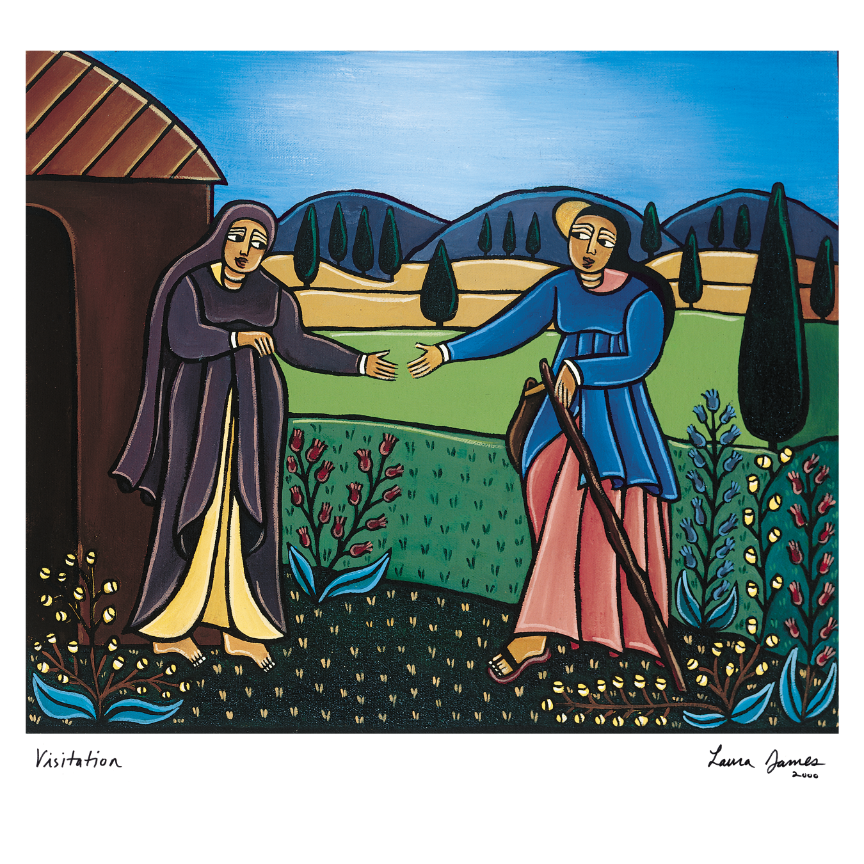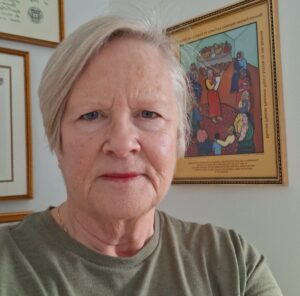Diaconal families at school with the poor: Jubilee, a time of solidarity

When Luke beautifully recounts how the Virgin Mary sets out on a hurried journey to a mountainous region to visit her cousin Elizabeth, he describes her dedication and self-giving in going forth to serve. Considering that Elizabeth is going to give birth in her old age, certainly without the facilities we have today, with exhausting days of walking while pregnant and in a climate that is not necessarily mild, Mary does this to help with the birth, to learn about all the conditions that arise for a woman at the end of pregnancy. This is so humanly beautiful because she is a woman, because she is a mother, but with so much exhaustion and uncertainty about how the birth will be and the first moments when the child is born, Mary is present, helping, learning, and serving Elizabeth.
The story makes me aware and confirms that, in times of change in the face of shocking situations, Mary goes with another woman. Mary, the pregnant but unmarried woman, travels to the mountainous region to be with her older cousin Elizabeth. She is pregnant, facing an overwhelming change and the implications of isolation in her life.
So, it seems sensible to ask, why go to another woman, an elderly woman? But for a woman, it makes sense: it is about seeking the support of another woman in the midst of struggle. “Fight or flight” is not the primary or normal response for women. Women under stress “care and befriend,” gathering with other women to build. Women under stress care for each other, care for children, bring us together to support each other, to sustain the human community, to allow others to support us when we cannot support ourselves.
Mary and Elizabeth teach us:
- Solidarity: that as women we count on each other, we have each other.
- Service: the divine midwife and the servitude of both.
- The encounter: between Elizabeth, an elderly woman with wisdom from her years, and Mary, a maiden in the Old and New Testaments.
- Serenity: to manage confusion and dispel pain.
- Support: to add to this, women bear life and we gather together to be the church.
- Gratitude: They were grateful for this little piece of shared humanity, for this refuge of emotional security, for this personal place of support.
- Hope: for sustenance that it brought for the future.
- The testimony of the domestic church: Mary, Joseph, and Jesus, Elizabeth, Zechariah, and John. We are all family.
Seeing so many wonderful women, wives of permanent deacons who, through their witness as diaconal families, live the values of the Gospel radically in the manner of Jesus, gives me faith. Seeing them pray and work as baptized women, seeing them lead their families like Mary the Servant, confirms that the Church is unity, that it is built, and that within it there is room for vulnerability, fragility, and limits. This involves the constant exercise of reconciliation and forgiveness, which requires us to step out of our comfort zone and learn in the spirit. Without this, there can be no authentic following of Jesus.
The testimony of wives is so rich, and in them we see the sanctifying grace that their husbands share as ordained ministers. They say yes to service, giving their lives and their families to be families that reach out, diaconal families.
Teresa is a woman, daughter, wife, mother, and grandmother who dedicates her days to leading training teams for prison ministry workers to bring hope to people deprived of their liberty in prisons. She also teaches Christian initiation catechesis in the parish, supports the medical brigades accompanying her husband, a lay minister, and they leave the city for various places in Colombia to care for the families of people deprived of their liberty and obtain medical personnel and medicines to help them.
Marina is in charge of the pastoral care of health. She visits people who need companionship and prayer in the pain of illness, brings them Holy Communion, and accompanies her husband Dp. in premarital catechesis.
Gloria supports the Food Bank, which seeks to assist people in situations of food insecurity. She also accompanies her husband, Dp., in his work in the parish as a lector and supports groups of children and young people in Christian initiation courses.
Cristina supports the Migrant Care Foundation, especially people who have been displaced. Here they offer them shelter to help dignify their lives, with the aim of alleviating the most immediate needs of the family group. Similarly, together with her husband, she leads the premarital program.
Olga prays constantly before the Blessed Sacrament and is a catechist accompanying her husband, Dp., in the parish.
Helena is a psychologist and supports her husband, Dp., in the parish with people who need to be listened to in the pastoral ministry of Listening.
And so we find many women who are witnesses of dedication with full adherence to Jesus Christ as baptized Christians. They are all models for all women who seek, who strive, who support one another. Their mission is simply to love and to make a greater project possible.
Every wife remembers that in our lives we have known older women who have been points of reference in our lives, and we also remember young women who have been able to take risks, to go one step further. In our lives, women teach us to do together what we cannot do alone; they teach us not to be defeated by adversity.
We must not forget that to be a woman of God is to live under the Spirit of God and to be a creative part of his plan.
Diaconia involves serving, and service should sanctify us. Service should make us understand that we must lower ourselves, humble ourselves in order to care for, gather, and lift up our neighbor. Service makes God live in me; I must let myself be carried by the Holy Spirit. We must be authentic servants, and these servants must have the vulnerability to see the wounds of our brothers and sisters. Wounds are the door to God’s heart.
Diaconal families are servants of our spouses, our children, and an entire generation, and with our witness as a family, we have changed an entire generation. Are we aware of our responsibility? A servant touches people’s hearts to change a whole life.
To spread strength, clothe ourselves in peace, launch ourselves boldly, and live more radically, it is necessary to be brothers and sisters today more than ever. We are called to be better witnesses as a diaconal family, to see my brothers and sisters as integral beings, absolutely human in attention to reality. We must do this together, in the style of Jesus, to be better witnesses and grow in the conviction of service.
Finally, we have several ways to fulfill his plans:
- By giving space and respecting the gifts that the Holy Spirit has given to each person, seeing the grace in each one and understanding individual greatness and the importance of co-creating together.
- I am not saved alone, we are all saved, widening the heart of the Church until there is room for everyone.
- When I step out of my comfort zone and go out, I commit myself to contributing to the transformation of the realities of communities.
- Going out requires time, processes, and patience.
- The challenge is to encounter others, to purify relationships in order to make possible a culture of care similar to that of Jesus.

María Nery Malagón Muñoz
Wife of Deacon Alejandro Leal Burgos
Servants in Colombia
This essay was first published in Italian as: “Le famiglie diaconali alla scuola dei poveri: Giubileo, un tempo solidale” Il Diaconato in Italia, vol. 253, Aug. 2025, pp. 57–60. https://www.comunitadiaconato.com/la-rivista-il-diaconato-in-italia. It is reprinted in English with permission.


